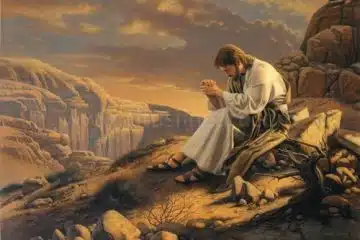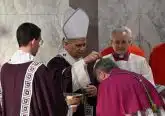Sunday Scripture: The Shepherd King
November 20, 2011
By Terrance Callan
Christ the King: Ezekiel 34:11-12, 15-17; 1 Corinthians 15:20-26, 28; Matthew 25:31-46
In the United States we do not tend to think very favorably about kings; our country was established by revolution against the king of England.
But in other parts of the world today, as in the Roman empire of Jesus’ day, kings are figures of power and majesty. Our belief that Jesus is a king requires that we think of kings in this more positive way, but also realize that He is a king unlike any other.
In the reading from the Gospel according to Matthew, Jesus describes the judgment that will occur at the end of the world. The Son of Man, i.e., Jesus, “will sit upon His glorious throne, and all the nations will be assembled before Him.” The Son of Man will separate the nations as a shepherd separates sheep from goats. The king will put the sheep on His right and the goats on His left.
To those on His right He will say, “Come, you who are blessed by my Father. …For I was hungry and you gave me food, I was thirsty and you gave me drink, etc.”
To those on His left He will say, “Depart from me, you accursed, …. For I was hungry and you gave me no food, I was thirsty and you gave me no drink, etc.”
Both groups will ask when they treated Jesus in the way He describes. To both Jesus says that whatever they did or did not do to one of His least brothers, they did or did not do to Him.
This description is somewhat unsettling. It suggests that ultimately the only thing that matters in life is to perform the corporal works of mercy. If we feed the hungry, give drink to the thirsty, etc., we feed, give drink, etc. to Jesus and so will be invited into the kingdom of God. If we do not feed the hungry, etc., we deny food, etc. to Jesus and so will not enter the kingdom of God.
We may wonder if this is really the only thing that matters; is nothing else important? I suspect that the description overstates the importance of the corporal works of mercy. What makes them important is that they bring us into close contact with Jesus. Other things that unite us with Jesus are also important, e. g., the sacraments and prayer. But the exaggeration is intended to make us aware that the corporal works of mercy are some of the best ways to be with Jesus.
As described by Jesus, the final judgment will fulfill what was promised in the reading from the prophet Ezekiel. Through the prophet, God promised that He himself will tend His sheep. God will gather together the scattered sheep, pasture them, give them rest, and tend to the injured and sick. But God will also “judge between one sheep and another, between rams and goats.” As described by Jesus, the final judgment most obviously fulfills God’s promise to judge the sheep. However, Jesus’ identification of himself with the hungry, thirsty, etc., and urging His followers to care for their needs, can also be seen as fulfilling God’s promise to care for His sheep.
The reading from the First Letter of St. Paul to the Corinthians describes another, more profound, way God has cared for His sheep by sending Jesus. The death and resurrection of Jesus has set the human race free from the effects of Adam’s sin. Adam’s sin led to death for all; Jesus’ resurrection means life for all. Christ is the “firstfruits” of the resurrection. When He comes again, we too shall rise to new life. At that point Jesus will have overcome death, the last of the powers of evil to be destroyed. His kingdom will be complete, and He will turn it over to God the Father.
Callan is a faculty member at the Athenaeum of Ohio.













